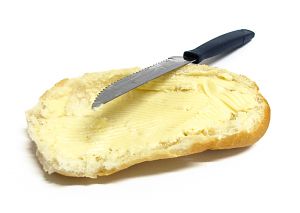Recommended
- Dr Fuhrman
- Vegan DHA
- iHerb (Great for ordering supplements, even if you're not in the US. Get $10 off your first order of $40 or more, or $5 off smaller orders, if you use coupon code GUH019)
Masai People and Heart Disease on a High Saturated Fat Diet

If you are interested in nutrition and have access to the internet, it is highly likely that at some point or another you came across views that are contradictory to everything you ever learned. There is a highly vocal group of people that claims that saturated fat is actually good for you. When you first look at the sites the evidence seems convincing, but if you look further you will see that they all reference each other and the few carefully picked studies that support their ideas. Let's discuss two of the most cited arguments.
The Masai eat lots of dairy and do not get heart disease
The Masai (or Maasai) are a people in Kenia. They use lots of dairy products and there arteries show for it: The coronary arteries showed intimal thickening by atherosclerosis which equaled that of old U.S. men (Atherosclerosis in the Masai). It is true that they do not get heart disease, but keep in mind that the life expectancy of the Masai is below 50 years. Many people in western countries don't get heart disease either, even if they are living on a chips and cheese diet. That is not the only explanation though: the researchers conclude that their exceptional level of fitness is probably an important factor: it makes the arteries expand so that blood can still flow, even with all the plaque.
The Masai get away with eating an artery clogging diet but that does not mean you can too. They have been eating lots of vegetables and herbs their entire lives. They have been physically active their entire lives. They have lived their entire lives in a natural environment and they are generally happy people. Even if you eat healthy now, chances are you grew up with refined grains and not enough exercise. Your arteries likely are already clogged and much less able to withstand the saturated fat than the arteries of the Masai. On the other hand: you will hopefully live much longer than most Masai. There also may be other factors at play that we do not know yet. Maybe the Masai eat a diet that is naturally rich in plaque removing substances. Maybe they have good genes.
Contradictory studies
The saturated fat - heart disease connection is very strong. It is untrue that the real experts do not believe anymore that saturated fat is bad: this is only a handful of doctors and other people that promote shabby research or take good research out of context. If you look for it, you can find studies that support every controversial opnion easily. The Japanese smoke much more than people in Europe and the US, yet have much less heart disease. Does this mean that smoking is actually good for you? There are people that think so.
Polyunsaturated fats are the real bad fats
Most of the pro saturated fat research concludes that extracted polyunsaturated oils are even worse than saturated fats. I agree that polyunsaturated oils should be severely limited as well (and the fact that trans fat is bad for you is already undisputed), but that is irrelevant. Two wrongs don't make a right.
Conclusion
All that said, I don’t think saturated fat is actually poisonous. Nuts and seeds also contain saturated fat and I do not think there is anything wrong with eating coconuts every once in a while. No naturally occurring nutrient is totally good or bad. If you are lean and active and eating a healthy diet with lots of vegetables, I would not worry about saturated fat. Just do not think about it as health promoting.
Addendum
A reader commented that life expectancy does not say much, and he is right. In poor countries, life expectancy numbers are skewed, because so many children die at birth. If you have ten people die at birth and ten die at age 90, the average life expectancy is still only 45 years. However, in this particular case I do not think it is very relevant, because life expectancy at age 15 in Kenia is still only 60 years. It is also interesting to note that one of the reasons that the Masai have such a high neonatal mortality rate is exactly because of their beliefs about a healthy diet: Masai women eat less food during pregnancy because they want smaller babies.
September 13, 2006